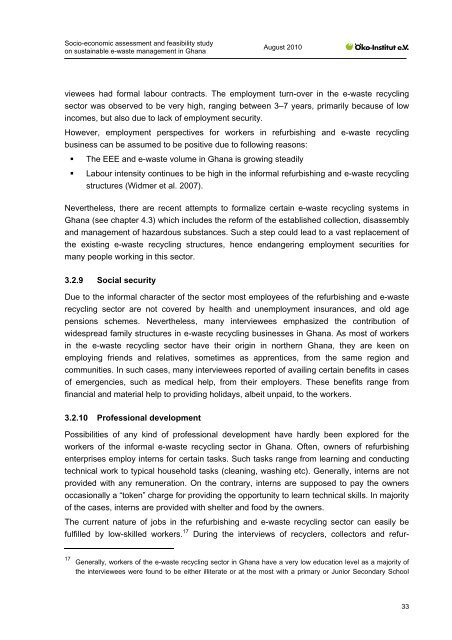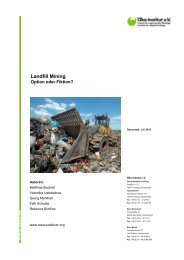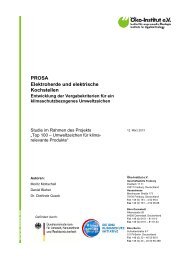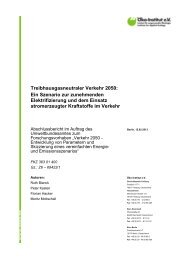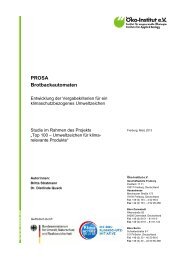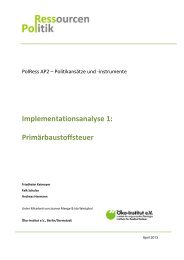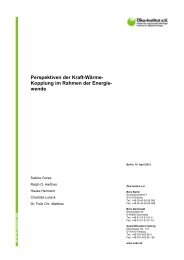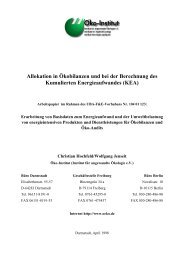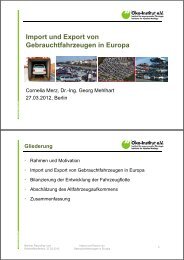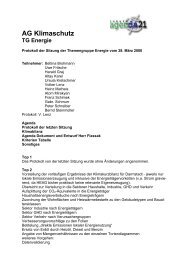Socio-economic assessment and feasibility study on - Öko-Institut eV
Socio-economic assessment and feasibility study on - Öko-Institut eV
Socio-economic assessment and feasibility study on - Öko-Institut eV
You also want an ePaper? Increase the reach of your titles
YUMPU automatically turns print PDFs into web optimized ePapers that Google loves.
<str<strong>on</strong>g>Socio</str<strong>on</strong>g>-<str<strong>on</strong>g>ec<strong>on</strong>omic</str<strong>on</strong>g> <str<strong>on</strong>g>assessment</str<strong>on</strong>g> <str<strong>on</strong>g>and</str<strong>on</strong>g> <str<strong>on</strong>g>feasibility</str<strong>on</strong>g> <str<strong>on</strong>g>study</str<strong>on</strong>g><br />
<strong>on</strong> sustainable e-waste management in Ghana<br />
August 2010<br />
viewees had formal labour c<strong>on</strong>tracts. The employment turn-over in the e-waste recycling<br />
sector was observed to be very high, ranging between 3–7 years, primarily because of low<br />
incomes, but also due to lack of employment security.<br />
However, employment perspectives for workers in refurbishing <str<strong>on</strong>g>and</str<strong>on</strong>g> e-waste recycling<br />
business can be assumed to be positive due to following reas<strong>on</strong>s:<br />
� The EEE <str<strong>on</strong>g>and</str<strong>on</strong>g> e-waste volume in Ghana is growing steadily<br />
� Labour intensity c<strong>on</strong>tinues to be high in the informal refurbishing <str<strong>on</strong>g>and</str<strong>on</strong>g> e-waste recycling<br />
structures (Widmer et al. 2007).<br />
Nevertheless, there are recent attempts to formalize certain e-waste recycling systems in<br />
Ghana (see chapter 4.3) which includes the reform of the established collecti<strong>on</strong>, disassembly<br />
<str<strong>on</strong>g>and</str<strong>on</strong>g> management of hazardous substances. Such a step could lead to a vast replacement of<br />
the existing e-waste recycling structures, hence endangering employment securities for<br />
many people working in this sector.<br />
3.2.9 Social security<br />
Due to the informal character of the sector most employees of the refurbishing <str<strong>on</strong>g>and</str<strong>on</strong>g> e-waste<br />
recycling sector are not covered by health <str<strong>on</strong>g>and</str<strong>on</strong>g> unemployment insurances, <str<strong>on</strong>g>and</str<strong>on</strong>g> old age<br />
pensi<strong>on</strong>s schemes. Nevertheless, many interviewees emphasized the c<strong>on</strong>tributi<strong>on</strong> of<br />
widespread family structures in e-waste recycling businesses in Ghana. As most of workers<br />
in the e-waste recycling sector have their origin in northern Ghana, they are keen <strong>on</strong><br />
employing friends <str<strong>on</strong>g>and</str<strong>on</strong>g> relatives, sometimes as apprentices, from the same regi<strong>on</strong> <str<strong>on</strong>g>and</str<strong>on</strong>g><br />
communities. In such cases, many interviewees reported of availing certain benefits in cases<br />
of emergencies, such as medical help, from their employers. These benefits range from<br />
financial <str<strong>on</strong>g>and</str<strong>on</strong>g> material help to providing holidays, albeit unpaid, to the workers.<br />
3.2.10 Professi<strong>on</strong>al development<br />
Possibilities of any kind of professi<strong>on</strong>al development have hardly been explored for the<br />
workers of the informal e-waste recycling sector in Ghana. Often, owners of refurbishing<br />
enterprises employ interns for certain tasks. Such tasks range from learning <str<strong>on</strong>g>and</str<strong>on</strong>g> c<strong>on</strong>ducting<br />
technical work to typical household tasks (cleaning, washing etc). Generally, interns are not<br />
provided with any remunerati<strong>on</strong>. On the c<strong>on</strong>trary, interns are supposed to pay the owners<br />
occasi<strong>on</strong>ally a “token” charge for providing the opportunity to learn technical skills. In majority<br />
of the cases, interns are provided with shelter <str<strong>on</strong>g>and</str<strong>on</strong>g> food by the owners.<br />
The current nature of jobs in the refurbishing <str<strong>on</strong>g>and</str<strong>on</strong>g> e-waste recycling sector can easily be<br />
fulfilled by low-skilled workers. 17 During the interviews of recyclers, collectors <str<strong>on</strong>g>and</str<strong>on</strong>g> refur-<br />
17 Generally, workers of the e-waste recycling sector in Ghana have a very low educati<strong>on</strong> level as a majority of<br />
the interviewees were found to be either illiterate or at the most with a primary or Junior Sec<strong>on</strong>dary School<br />
33


